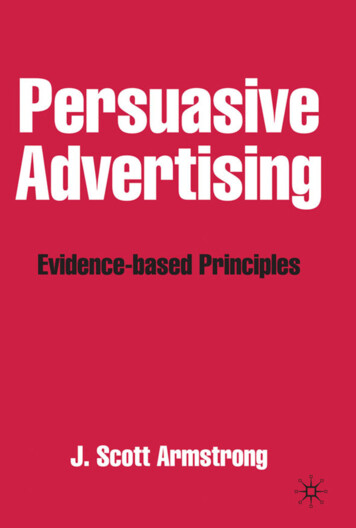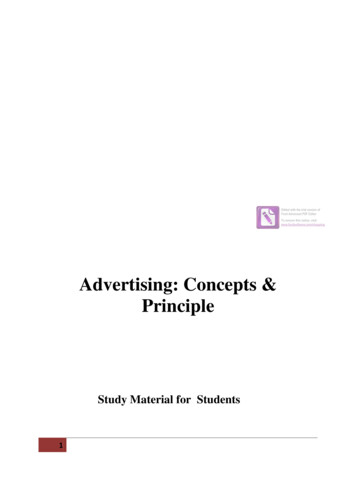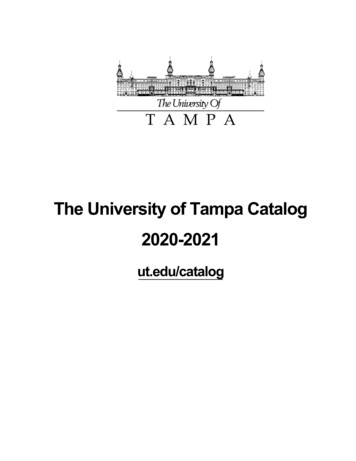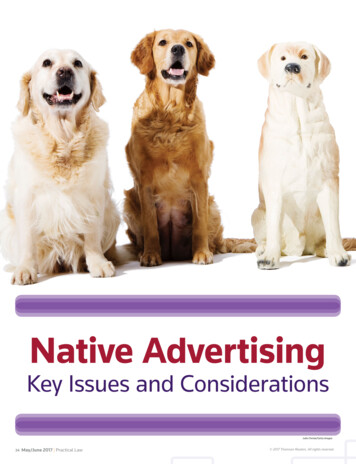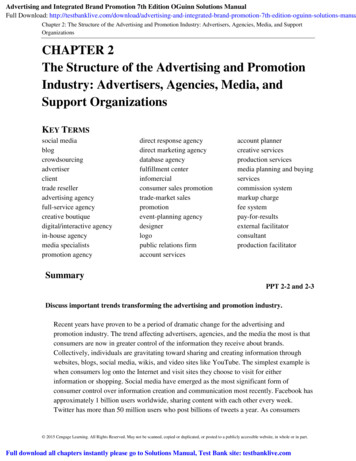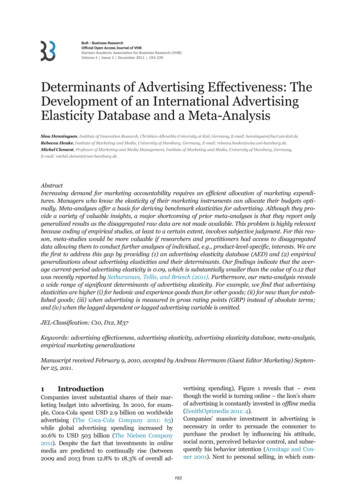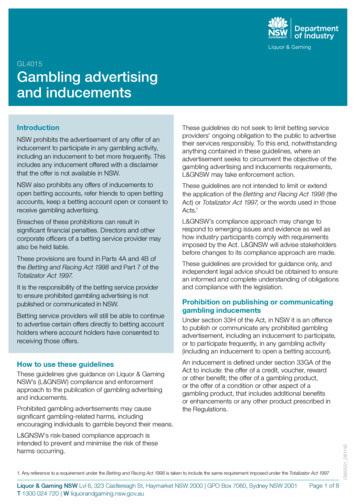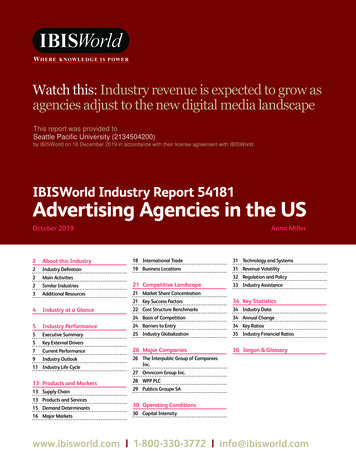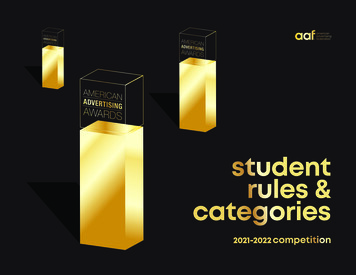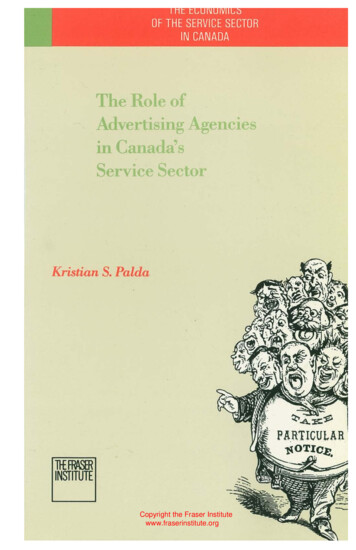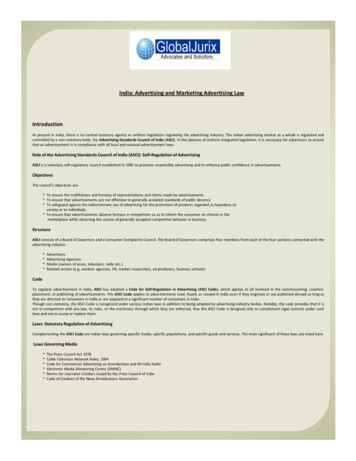
Transcription
India: Advertising and Marketing Advertising LawIntroductionAt present in India, there is no central statutory agency or uniform legislation regulating the advertising industry. The Indian advertising market as a whole is regulated andcontrolled by a non-statutory body, the Advertising Standards Council of India (ASCI). In the absence of uniform integrated legislation, it is necessary for advertisers to ensurethat an advertisement is in compliance with all local and national advertisement laws.Role of the Advertising Standards Council of India (ASCI): Self-Regulation of AdvertisingASCI is a voluntary self-regulatory council established in 1985 to promote responsible advertising and to enhance public confidence in advertisements.ObjectivesThe council’s objectives are:* To ensure the truthfulness and honesty of representations and claims made by advertisements* To ensure that advertisements are not offensive to generally accepted standards of public decency* To safeguard against the indiscriminate use of advertising for the promotion of products regarded as hazardous tosociety or to individuals.* To ensure that advertisements observe fairness in competition so as to inform the consumer on choices in themarketplace while observing the canons of generally accepted competitive behavior in businessStructureASCI consists of a Board of Governors and a Consumer Complaints Council. The Board of Governors comprises four members from each of the four sections connected with theadvertising industry:****AdvertisersAdvertising AgenciesMedia (owners of press, television, radio etc.)Related sectors (e.g. outdoor agencies, PR, market researchers, ad producers, business schools)CodeTo regulate advertisement in India, ASCI has adopted a Code for Self-Regulation in Advertising (ASCI Code), which applies to all involved in the commissioning, creation,placement, or publishing of advertisements. This ASCI Code applies to advertisements read, heard, or viewed in India even if they originate or are published abroad so long asthey are directed to consumers in India or are exposed to a significant number of consumers in India.Though non-statutory, the ASCI Code is recognized under various Indian laws in addition to being adopted by advertising-industry bodies. Notably, the code provides that it isnot in competition with any law, its rules, or the machinery through which they are enforced, thus the ASCI Code is designed only to complement legal controls under suchlaws and not to usurp or replace them.Laws: Statutory Regulation of AdvertisingComplementing the ASCI Code are Indian laws governing specific media, specific populations, and specific goods and services. The most significant of these laws are listed here.Laws Governing Media******The Press Council Act 1978Cable Television Network Rules, 1994Code for Commercial Advertising on Doordarshan and All India RadioElectronic Media Monitoring Centre (EMMC)Norms for Journalist Conduct issued by the Press Council of IndiaCode of Conduct of the News Broadcasters Association
Laws Protecting Society and the Consumer*******Emblems and Names (Prevention of Improper Use) Act, 1950Young Persons (Harmful Publications) Act, 1956Companies Act, 1956Standards of Weight & Measures Act, 1976Indecent Representation of Women (Prohibition) Act, 1986Consumer Protection Act, 1986Laws related to intellectual property rightsIndustry-Specific Laws************The Drugs and Cosmetic Act, 1940The Transplantation of Human Organs Act, 1994The Drugs and Magical Remedies (Objectionable Advertisements) Act, 1954The Prenatal Diagnostic Techniques (Regulation and Prevention of Misuse) Act, 1994Advocates Act, 1961Infant Milk Substitutes, Feeding Bottles and Infant Foods (Regulation of Production, Supply and Distribution)Act, 1992Securities and Exchange Board of India Act, 1992The Prize Chits and Money Circulation Schemes (Banning) Act, 1978Cigarettes and other Tobacco Products (Prohibition of Advertisement and Regulation of Trade andCommerce, Production, Supply and Distribution) Act, 2003Public Gambling Act, 1867, the Lotteries (Regulation) Act, 1998 and the Prize Competitions Act, 1955Indian Medical Council (Professional Conduct, Etiquette and Ethics) Regulations, 2002The Food Safety and Standards Act, 2006Products and Services Banned From AdvertisingFirearms, Weapons, and AmmunitionSale and purchase of such items requires a license from government authorities. Therefore, advertisements related to such products are not permissible in India under theArms Act, 1959.Human OrgansThe Transplantation of Human Organs Act, 1994 provides for the regulation of removal, storage, and transplantation of human organs for therapeutic purposes and for theprevention of commercial dealings in human organs. This law prohibits any advertising inviting persons to supply, or offering to supply, any human organ for payment.Infant Milk Food (Formula)Advertising forbidden in order to encourage natural feeding of infants. See details under Food.Legal ServicesThe Bar Council of India Rules formulated under the Advocates Act, 1961 prohibit advertisement by Indian advocates and their firms. These rules were enacted and enforcedto curb the false advertisement of lawyers to gain publicity to attract clients.Magical RemediesThe Drugs and Magical Remedies (Objectionable Advertisements) Act, 1954 prohibits advertisement of magical remedies of diseases and disorders.Services for Prenatal Determination of SexThe Prenatal Diagnostic Techniques (Regulation and Prevention of Misuse) Act, 1994 prohibits advertisements relating to prenatal determination of sexPhysiciansUnder the Indian Medical Council (Professional Conduct, Etiquette and Ethics) Regulations, 2002, issued under the Indian Medical Council Act, 1956, physicians are notallowed to advertise their services in any form or manner of advertising through any mode, as soliciting of patients directly or indirectly, by a physician, by a group ofphysicians, or by institutions or organizations is unethical. (A physician refers to a doctor with a qualification of MBBS or MBBS with a postgraduate degree/diploma or withan equivalent qualification in any medical discipline.) However, medical practitioners are allowed to make a formal announcement in press regarding the following:*******On starting practiceOn change of type of practiceOn changing addressOn temporary absence from dutyOn resumption of another practiceOn succeeding to another practicePublic declaration of charges
Prize Chits and Money Circulation SchemesThe Prize Chits and Money Circulation Schemes (Banning) Act, 1978 prohibits advertisements relating to prize chit and money circulation schemes.A prize chit is defined as follows:Any transaction or arrangement under which a person collects monies by way of contributions orsubscriptions or by sale of units, certificates, or other instruments or in any other manner or as membershipfees or admission fees or service charges to or in respect of any savings, mutual benefit, thrift, or any otherscheme or arrangement by whatever name called, and utilises the monies so collected inter alia for aspecified number of subscribers as determined by lot, draw, or in any other manner, prizes or gifts in cash orin kind.Tobacco ProductsThe Cigarettes and other Tobacco Products (Prohibition of Advertisement and Regulation of Trade and Commerce, Production, Supply and Distribution) Act, 2003(“Tobacco Prohibition Act”) prohibits all direct and indirect advertising of tobacco products in all media.Regulations Related to Product and Service AdvertisingAlcoholThe Cable Television Network Rules, 1994, the Advertising Codes of Doordarshan and the All India Radio, and Norms for Journalist Conduct issued by the Press Councilof India prohibit any advertisement directly or indirectly promoting the production, sale, or consumption of cigarettes, tobacco products, wine, liquor, or other intoxicants.However, some states allow advertising through billboards, signboards, and such media, but subject to many restrictions. Also, the ASCI Code prohibits use of minors foradvertising alcohol products.CosmeticsSee under Pharmaceuticals, below.Advertisement by Companies to Shareholders, Etc.The Companies Act, 1956 stipulates that no deposits from the general public should be accepted by public companies (other than non-banking financial companies)without issuing advertisement following the prescribed norms. The law also specifies various provisions relating to advertisement by Indian companies.Firearms, Weapons, and AmmunitionAdvertising is banned; see above.FoodAs per the Food Safety & Standards Act, 2006, no advertisement relating to the standard, quality, quantity or grade-composition, and no representation concerning theneed for, or the usefulness of any food can be made which is misleading or deceiving or which contravenes the provisions of this law or rules and regulations madethereunder.Nutritional ClaimsNutritional claims by the advertiser for selling a product undergo a keen check by the Food Safety and Standards Authority of India, which is the country’s food regulatorunder the provisions of the Food Safety & Standards Act, 2006. This regulatory body prohibits any kind of false nutritional claims made by the companies and prohibitsthem from broadcasting on television.Infant Milk Food (Formula)The Infant Milk Substitutes, Feeding Bottles and Infant Foods (Regulation of Production, Supply and Distribution) Act, 1992 prohibits the advertising of infant milksubstitutes or feeding bottles.GamingThe federal structure in the Constitution of India explicitly gives the states the right to legislate upon “gambling and betting.” The Public Gambling Act, 1867 prohibitsgambling activities in India. However, the law permits games of mere skill. In April, 2011, the Information Technology Act, 2000 was also amended to ban Internetgambling and online betting websites. The Lotteries (Regulation) Act, 1998 gives power to the concerned State government to hold lotteries subject to prescribedconditions. Under section 294-A of the Indian Penal Code, advertisements of a lottery unless it is in accordance with the Lotteries (Regulation) Act shall be punishable.The Prize Competitions Act, 1955 controls and regulates prize competitions in certain parts of India and prohibits the advertisement of unauthorized prize competitions.Of note, though unrelated to advertising, the Indian government’s Foreign Direct Investment Policy does not permit foreign investment in “Lottery Business includinggovernment /private lottery, online lotteries, gambling and betting, including casinos, etc.”Legal ServicesAdvertising prohibited. See Legal Services under Products and Services Banned from Advertising, above.
Medical DevicesThe authority principally responsible for regulating medical devices in India is the Central Drugs Standard Control Organization (“CDSCO”) under the provisions of theDrugs & Cosmetics Act, 1940. CDSCO’s functions include regulating the medical devices industry by approving the import, manufacture, and sale of medical devices inIndia.Medical ServicesAn institution run by a physician for a particular purpose such as a maternity home, nursing home, private hospital, rehabilitation centre or any type of training institution,etc., may be advertised in the lay press, but such advertisements should not contain anything more than the name of the institution, type of patients admitted, type oftraining and other facilities offered and the fees.Nonprofit FundraisingAny funding for public nonprofit activities requires registration with the concerned state government. Also, fundraising from foreign entities requires prior approval of theIndian government under the provisions of theForeign Contribution Regulations Act, 2010.Nutritional SupplementsThese are regulated under the Food Safety and Standards Act, 2006, under the same terms as for food.Occult (“Psychic”) ServicesThese services are not legally recognized in India and are not permissible under the Drugs and Magical Remedies (Objectionable Advertisements) Act, 1954.Packaged Goods, Etc.The Standards of Weight & Measures Act, 1976 prohibits issuing advertisements otherwise than in accordance with the provisions of this law.PharmaceuticalsPrescription-only drugs are those medicines that are listed in Schedules H and X of the Drug and Cosmetics Rules, 1945. The phrase over-the-counter (OTC) has no legalrecognition in India. All the drugs not included in the list of “prescription-only drugs” are considered to be non-prescription drugs (or OTC drugs).The Drugs and Cosmetics Act, 1940 prohibits advertisements for any drug or cosmetic from using reports of tests or analysis of the Central Drugs Laboratory or by agovernment analyst. This act also requires advertisement of certain medicines to be made in a prescribed manner.Political AdvertisingThe Representation of the People (Amendment) Act, 1996 has the following provisions* Political advertisements are prohibited for a period of forty-eight hours ending with the hours fixed forconclusion of polling for any elections in a given polling area. The law stipulates that during this time, aperson shall not display to the public any election matter by means of cinematography, television, or othersimilar apparatus.* Use of displaying posters, signboards, and similar means for political advertisement in any public placemust be strictly in accordance with the relevant provisions of the local laws* Equitable opportunity to all political parties and candidates are to have access to public advertisementspace for election-related advertisements during the election period* Use of private premises for political advertisement may be made only with the voluntary permission of theoccupant* Prohibition of any and all advertisements is at the cost of the public exchequer regarding achievements ofthe political party/ruling governmentThe statute provides for a penalty of imprisonment and/or fine for anyone, including advertisers, who contravenes these provisions.Products Related to SexualityAdvertisements related to sexuality are allowed with the provision that there should not be any indecent representation of women under the Indecent Representation ofWomen (Prohibition) Act 1986. Products must comply with the Drugs and Cosmetic Act 1940 and other certification rules under the Cable Television Network Rules 1994.Professionals such as Chartered Accountants, Company Secretaries, and Cost AccountantsThese professionals are prohibited from soliciting clients or professional work by advertisement. However, they may issue advertisements about their firm or the servicesof their firm, through any mode of transmission, showing the following details:*****Names of partnersAddress and website, telephone, mobile, e-mail, fax numberYear of establishmentAdditional recognized qualificationsLanguages spoken by the partner(s)
* Honors or awards in the field of teaching, research, authorship, and so on, conferred by nationallyaccredited institutions* Details of networking through own office or through formal association in other places within and outsideIndia* Number and name of employees of the firm and their qualifications and other particulars, willingness (orunwillingness) to accept work, either generally or in particular areas of practice* Display of a passport-size photograph of firm members* Particulars of services* Names of clients and services providedReligionUnder the Cable Television Networks Rules 1994, the Advertising Codes of Doordarshan & All India Radio and Norms for Journalist Conduct issued by the Press Councilof India, advertisement based on religion or to hurt religious sentiments are not allowed. Also, such advertisement may be punishable under the Indian Penal Code1860.SecuritiesThe Securities and Exchange Board of India (Prohibition of Fraudulent and Unfair Trade Practices Relating to Securities Market) Regulations, 2003 issued under section30 of the Securities and Exchange Board of India Act, 1992 prohibits fraudulent or unfair trade in securities. These regulations further provide that dealing in securitiesshall be deemed to be a fraudulent or an unfair trade practice if it involves an advertisement that is misleading or contains distorted information and which mayinfluence the decision of the investors.Sex (Adult) ServicesAdvertisement pertaining to sexual services is illegal in India.Tobacco ProductsAdvertising prohibited.ToysThere is no specific restriction on the advertisement of toys provided advertisements are in compliance with other applicable lawsRegulations Related to Advertising MethodologyAdvertising to ChildrenThe Young Persons (Harmful Publications) Act, 1956 prohibits advertisements relating to any harmful publication, i.e., any publication that tends tocorrupt a young person (person under the age of 18 years) by inciting or encouraging him or her to commit offenses or acts of violence or cruelty orin any other manner whatsoever.According to the ASCI Code, advertisements addressed to minors shall not contain anything, whether in illustration or otherwise, which might resultin their physical, mental, or moral harm or which exploits their vulnerability. For example, advertisements may not:* Encourage minors to enter strange places or to converse with strangers in an effort to collect coupons,wrappers, labels or the like* Feature dangerous or hazardous acts which are likely to encourage minors to emulate such acts in amanner which could cause harm or injury* Show minors using or playing with matches or any flammable or explosive substance; or playing with orusing sharp knives, guns, or mechanical or electrical appliances, the careless use of which could lead totheir suffering cuts, burns, shocks, or other injury* Feature minors in promoting tobacco or alcohol-based products* Feature personalities from the field of sports, music, or cinema for products which, by law, either require ahealth warning in their advertising or cannot be purchased by minorsCelebrity EndorsementsNo current restrictions
Comparative AdvertisingThe provisions pertaining to comparative representation were part of “Unfair Trade Practice” under the Monopolies and Restrictive Trade Practices Act, 1969 (MRTPAct). After repeal of the MRTP Act, the provisions relating to unfair trade practices were inserted in the Consumer Protection Act, 1986. However, a business entitycannot claim relief against unfair comparative advertising under the Consumer Protection Act, as a business entity is not a consumer. This can be taken up only byconsumer associations, the central government, or state governments, and it does not provide protection to the business entity equal to the protection under the MRTPAct. Thus, under the existing law, a manufacturer whose goods are disparaged has no standing to seek a remedy. Presently, in the absence of any specific legislationregulating comparative advertising, disputes are decided by various courts on the basis of the facts in each case. However, ASCI Code (which is made part of the CableTelevision Network Rules, 1994 as well) permits advertisement containing comparisons including those where a competitor is named in the interests of vigorouscompetition and public enlightenment, provided:* It is clear which aspects of the advertiser’s product are being compared with which aspects of thecompetitor’s product* The subject matter of comparison is not chosen in such a way as to confer an artificial advantage upon theadvertiser or so as to suggest that a better bargain is offered than is truly the case* The comparisons are factual, accurate and capable of substantiation* There is no likelihood of the consumer being misled as a result of the comparison, whether about theproduct advertised or that with which it is compared* The advertisement does not unfairly denigrate, attack or discredit other products, advertisers oradvertisements directly or by implicationPresently, ASCI is actively taking action against any advertisements making unsubstantiated claims, exaggeration, unfair denigration in violation of the ASCI Code.ContestsThe Public Gambling Act, 1867 prohibits gambling activities in India. However, the law permits games of mere skill.Deceptive, Misleading, or False AdvertisingDeceptive or misleading advertisements are restricted under various legislation including the Consumer Protection Act, 1986; the Cable Television Network Rules, 1994;the Norms for Journalist Conduct issued by the Press Council of India Act, and the ASCI Code.Disguised Ads and AdvertorialsThe Norms for Journalist Conduct issued by the Press Council of India, the Cable Television Network Rules, 1994, and the Advertising Code of Doordarshan require thatadvertisements must be clearly distinguishable from news content and programs.Free Gifts/SamplesThe Consumer Protection Act 1986, Section 2(3)(a) states that the following constitute unfair trade practice:* The offering of gifts, prizes or other items with the intention of not providing them as offered or creatingimpression that something is being given or offered free of charge when it is fully or partly covered by theamount charged in the transaction as a whole* The conduct of any contest, lottery, or game of chance or skill, for the purpose of promoting, directly orindirectly, the sale, use, or supply of any product or any business interestThe Norms for Journalist Conduct issued by the Press Council of India has stated that journalists should not accept gifts including those given by the advertisementagencies for publication of material relating to their clients or otherwise.Limits to Free SpeechArticle 19(1)(a) of the Constitution of India protects the right to freedom of speech and expression, which is also extended to advertisements. However, like any otherright, this freedom is also subject to reasonable restrictions imposed by Article 19(2) of the Constitution of India. Furthermore, the ASCI Code states that noadvertisement shall be permitted which:* Derides any race, caste, color, creed, or nationality* Tends to incite people to crime or to promote disorder and violence or intolerance* Presents criminality as desirable or directly or indirectly encourages people, particularly minors, toemulate it or conveys the modus operandi of any crime* Adversely affects friendly relations with a foreign stateAnother restriction is dictated by the Emblems and Names (Prevention of Improper Use) Act, 1950. See Use of a Public Person's Image or Name, below.
Length of Commercial, Volume, and Similar RestrictionsThe Telecom Regulatory Authority of India has issued the Standard of Quality of Service (Duration of Advertisements in Television Channels) Regulations, 2012, whichregulates the duration of broadcasting an advertisement and the length of the commercial. The main features of these regulations are as follows:* Advertisements exceeding 12 minutes in a clock hour; any shortfall of advertisement duration in any clockhour shall not be carried over by any broadcaster in any broadcast of its program* The time gap between end of one advertisement session and the commencement of next advertisementsession shall not be less than 15 minutes (30 minutes in case of a movie). However, this restriction is notapplicable to live broadcast of a sporting event.Rights of PrivacyThe Electronic Media Monitoring Centre of the Ministry of Information and Broadcasting, Government of India, has made self-regulatory guidelines applicable to thebroadcasting service provider wherein, to protect the privacy of an individual, it is stipulated that no program (including advertisement) should invade an individual’spersonal or private affairs or privacy unless there is an identifiable larger public interest.Product DemonstrationsNo current restrictionsRegional Public and/or Community StandardsUnder various legislation, including the Cable Television Network Rules, 1994; Norms for Journalist Conduct issued by the Press Council of India Act, and the ASCI Code,no advertisement to hurt community or any section of society is allowed. Also, such advertisements are punishable under the Indian Penal Code 1860.RebatesNo current restrictionsSex in AdvertisingThe Indian Penal Code 1860 prohibits obscene publications. Further, the Indecent Representation of Women (Prohibition) Act, 1986 prohibits indecent representationsof women.SponsorshipsProducts which are banned from advertising may not be used to provide any kind of sponsorship. Also, misleading representation of sponsorship is an unfair tradepractice under the Consumer Protection Act, 1986.Subliminal AdvertisingWhile there are no laws defining subliminal advertising or to restrict such practice, misleading advertisements are banned and restricted.Surrogate AdvertisingThe ASCI Code provides that advertisements of products whose advertising is prohibited or restricted by law or by the ASCI Code must not circumvent such restrictionsby purporting to be advertisements for other products the advertising of which is not prohibited or restricted by law or by ASCI Code. To determine if there is an indirectadvertisement of prohibited products due attention shall be given to the following:* Visual content of the advertisement must depict only the product being advertised and not the prohibitedor restricted product in any form or manner.* The advertisement must not make any direct or indirect reference to the prohibited or restricted products.* The advertisement must not create any nuances or phrases promoting prohibited products.* The advertisement must not use particular colours and layout or presentations associated with prohibitedor restricted products.* The advertisement must not use situations typical for promotion of prohibited or restricted products whenadvertising the other products.The Cable Television Networks Rules, 1994 also impose similar restrictions to curb surrogate advertising.Sweepstakes OffersNo current restrictions. However, any offer to deceive consumers is banned from advertising, and proper legal action will be taken against the responsible parties.TestimonialsAny testimonial must be true, failing which appropriate actions can be taken by ASCI and under the Consumer Protection Act 1986.Tie-In OffersNo specific restrictions
Use of a Public Person's Image or NameNo advertisement should be in violation of the Emblems and Names (Prevention of Improper Use) Act, 1950, which prohibits the improper use of names or pictorialrepresentation of certain famous persons for commercial use. Accordingly, names or images of Mahatma Gandhi, Jawaharlal Nehru, Indira Gandhi, Shivaji Maharaj or thePrime Minister of India or the words “Gandhi,” “Nehru” or “Shivaji” may not be used in advertisements.Use of Children in AdvertisingNo current restrictions, but other applicable laws need to be followed.Use of Foreign Language in AdvertisingNo current restrictions, but other applicable laws need to be followed.Use of Models as Doctors, Nurses, Lawyers, or other ProfessionalsThere are no restrictions on the use of models as doctors, nurses, or lawyers; however, there should be no misleading or controversial advertisement.Violence in AdvertisingThe Cable Television Network Rules, 1994, Norms for Journalist Conduct issued by the Press Council of India Act, Advertising Code of Doordarshan, and the ASCI Codeprohibit any violence in advertisements.Regulations Related to Media ChannelsBillboard AdvertisingOutdoor advertisement through billboards is regulated by jurisdictional municipal corporations. The content of the advertisement should, however, be in accordancewith the ASCI Code and other applicable laws.Digital Media AdvertisingOnline advertisement and website content including social media sites such as Facebook and Twitter must comply with a range of marketing, consumer, privacy, andcontract laws. Online advertisers should comply with ASCI, the Indian Penal Code, the Information Technology Act, 2000 and other applicable laws. For this purpose, theInformation Technology Act was amended in 2011.Direct Mail AdvertisingCurrently, no regulation exists specific to direct mail advertising. However, any such advertisement has to be in compliance with the ASCI Code and other applicablelaws.Email Advertising (Spam)Currently, no regulation exists specific to direct mail advertising. However, any such advertisement has to be in compliance with the ASCI Code and other applicablelaws.Newspaper and Periodical AdvertisingThe Press Council of India constituted under the Press Council of India Act 1978 has issued Norms for Journalist Conduct, a reference guide for the press. These normsinclude advertising norms similar to provisions in the ASCI Code and prohibit, inter alia, advertisements that are vulgar; advertisements promoting cigarettes, tobaccoproducts, wine, liquor, and other intoxicants; advertisements hurting religious or communal sentiments; or any advertisement prohibited by any other law. Also, ASCIhas approached the Press Council of India to incorporate the ASCI Code into its regulations.Radio and Doordarsan AdvertisingThe Code for Commercial Advertising on Doordarshan and All India Radio: All advertisement on Doordarshan and All India Radio (“AIR”) should conform to the codeissued by Director General of each Doordarshan and AIR respectively. These codes have also mandated compliance to the ASCI Code and in general prohibit anyadvertisement containing the following:*********Criticism of friendly countriesAttack on religions or communitiesObscenityDefamationIncitement to violence or anything against maintenance of law and orderContempt of courtAspersions against the integrity of the president and judiciaryAnything compromising the integrity of the nationCriticism by name of any person
Television AdvertisingThe advertising code issued under the Cable Television Network Rules, 1994 require advertising carried on the cable service to conform to the laws of
Regulatory Agencies Indian Broadcasting Foundation and Broadcasting Content Complaints Council (BCCC) The Secretary Broadcasting Content Complaints Council C/o Indian Broadcasting Foundation B-304, AnsalPlaza New Delhi 110047 India Email: bccc@ibfindia.com Tel: [91] (11) 43794488 Fax: [91] (11) 43794455 Web: www.ibfindia.com

